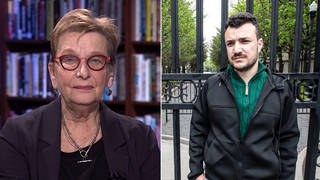
Guests
- Jeremiah Luria Johnsonreporter covering elections for KUNM community radio based in Albuquerque, New Mexico.
- Bruce Shapirocontributing editor for the Nation and a national correspondent for Salon.com. His most recent book is “Shaking the Foundations: 200 Years of Investigative Journalism in America.” He has been reporting from South Carolina this week.
Russell Mokhiber of Corporate Crime Reporter and Robert Weissman of Multinational Monitor sift through all the corporate schemes, scandals and crimes of 2003 to pick their top 10 worst corporations of the year. [includes transcript]
Russell Mokhiber of Corporate Crime Reporter and Robert Weissman of Multinational Monitor list in alphabetical order the 10 worst corporations of 2003:
Click here to read full article.
Bayer
Boeing
Brighthouse
Clear Channel
Diebold
Halliburton
HealthSouth
Inamed
Merrill Lynch
Safeway
Transcript
AMY GOODMAN: Russell Mokhiber is editor of the “Corporate Crime Reporter” in Washington, D.C. Russell, you also have come out with your ten worst corporations list this year of 2003. Can you go through the companies you have accused?
RUSSELL MOKHIBER: Well, actually, what we do every year — this is for the Multinational Monitor magazine, Robert Weissman and I. We open it up for nominations. We look at a long list of corporate wrongdoers, and then we sort of subjectively choose what we consider to be the ten worst.
The choices this year, the winners this year are Bayer, for pleading guilty to fraud charges and paying a $250 million fine. There were — they also were involved in problems with their drug, Bacol, which allegedly caused a fatal muscle disorder.
Boeing, was engaged in perhaps one of the grandest rip-offs in corporate welfare history, where they engaged in a tanker leasing arrangement, where instead of selling planes to the government, they leased them, and they made billions more than it would have cost to just sell them to the government.
Brighthouse, which is a company that has a Neurostrategy Institute that undertakes research to see how the brain responds to advertising campaigns.
Clear Channel, which has radio stations all over the country and is consolidating its power, dominating the airwaves, pushing out — pushing out alternative music and alternative views. Good op-ed on today’s “Washington Post,” by Don Henley, choosing the industry, saying that the industry will be dominated by three major multinational corporations within a couple of years.
Diebold, which your listeners know about. This is the company that makes ATM machines. They also make voting machines. The president of the company says — is a major fund raiser for President Bush. And there’s a real question now in people’s minds whether this is going to be a free and fair election this year here in the United States, with calls for outside observers from other countries to come in and observe.
Halliburton, which we have talked about.
HealthSouth, a company — a large health care company based in Alabama, 15 of its top executives have plead guilty to crimes. The founding executive and C.E.O. Is now facing trial in Birmingham.
Inamed, which is the company that makes silicone breast implants and despite a long history of medical studies showing that silicone breast implants are hazardous to women, they tried to muscle the F.D.A. into re-approving them for the market, and a coalition of women’s and health groups here stopped it.
Merrill Lynch — the brokerage firm based in New York City, which was fined $100 million. Remember the — their analysts were telling customers to buy these stocks even though they were telling each other that the stocks were not worth anything.
Finally, Safeway, the juggernaut supermarket that’s seeking to bust the unions across the United States and in California. And take back — take back health insurance and other benefits from workers. So, those are the ten worst corporations of 2003. Nominations are now open for 2004. And your listeners can go to multinationalmonitor.org and send their recommendations.
AMY GOODMAN: Finally, Russell Mokhiber, you spend a lot of time at the White House at the press briefings. Can you talk about the climate and how it has changed over the last week or two?
RUSSELL MOKHIBER: Well, when I can get in — I felt like at the beginning of this administration, I was — I and a few others, Helen Thomas, were just a handful of reporters who were trying to stick it to the administration, question them with some serious facts of alleged wrongdoing, questioning our policy in the middle east and Iraq and so forth.
But now, you know, we’re in the back watching as the front row tv journalists are hammering Scott McClellan. We hope they keep it up. I doubt it’s going to continue much longer. They say that the President wants to hold a press conference but he’s fearful of facing the pack. It’s now like an aggressive dog pack. He doesn’t want to face them down. So, we’ll see what happens. He needs to — he needs a lot of face time with the public. He needs to get his face out there, and answer questions. But I’m not sure he wants to face an angry mob of reporters. Maybe he will just wait until things quiet down a little bit.
AMY GOODMAN: Russell Mokhiber, I want to thank you for being with us, editor of “The Corporate Crime Reporter.”












Media Options